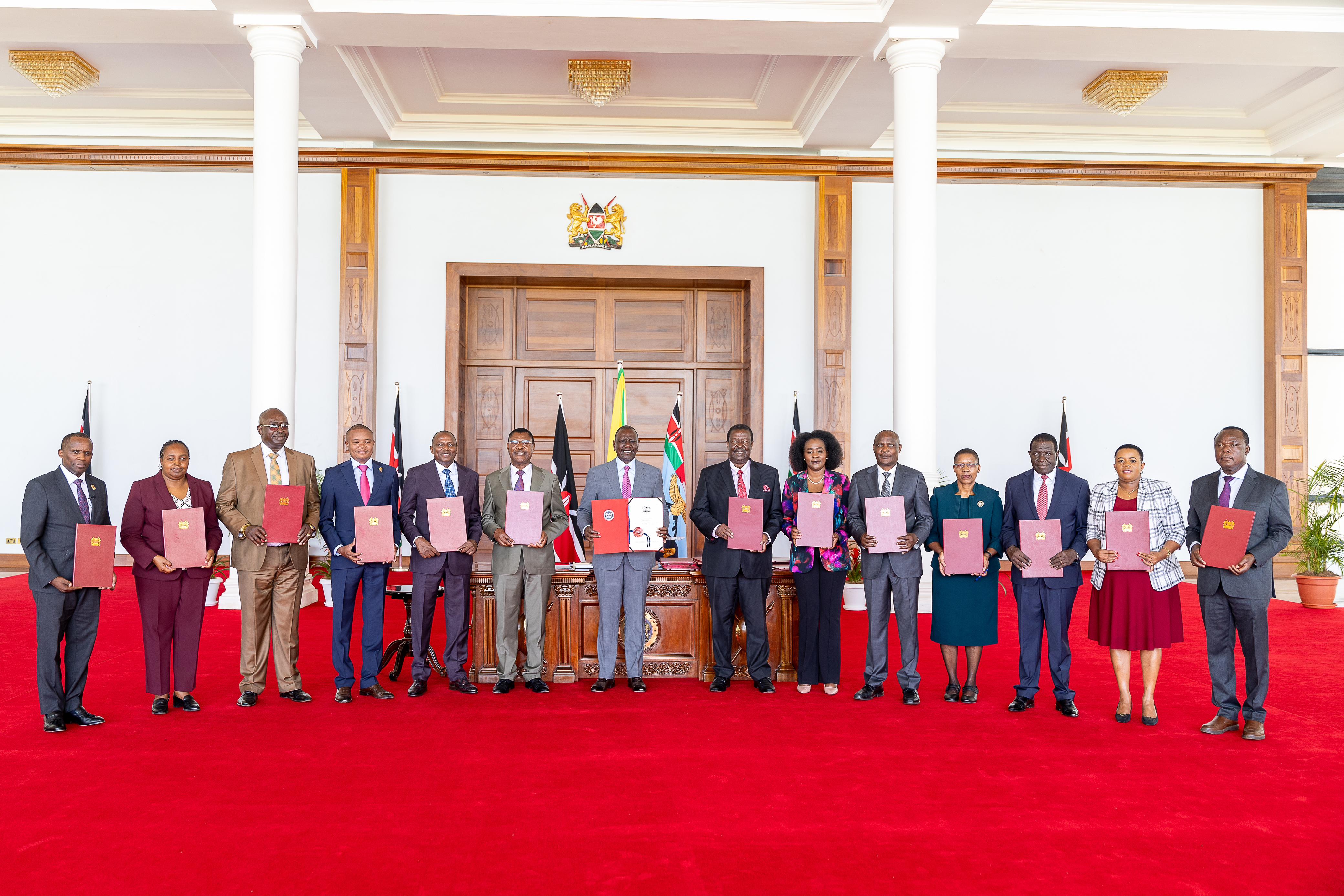

President William Ruto on Wednesday morning assented to at least seven Amendment Bills touching on various areas including taxes, development and statutory instruments.
The ceremony was held at State House, Nairobi, and was witnessed by several leaders including Prime Cabinet Secretary Musalia Mudavadi, Treasury Cabinet Secretary Mbadi, National Assembly Speaker Moses Wetang’ula, Attorney-General Dorcas Oduor, and MPs led by the Majority Leader Kimani Ichungw’ah, among others, were present.
The Bills include;
The Tax Laws (Amendment) Bill, 2024
The bill, introduced by National Assembly Majority Leader Kimani Ichung’wah, aims to align Kenya's tax policies with global standards while offering relief to employees, retirees, and businesses.
It allows taxpayers to deduct contributions to post-retirement medical funds and the Affordable Housing Levy from their tax obligations, this will help reduce the burden of double taxation.
The Bill raises the mortgage interest deduction limit from Sh300,000 to Sh360,000, to encourage more Kenyans to buy homes.
The bill also introduces an economic presence tax for non-residents and a minimum top-up tax for multinational companies, ensuring that global businesses contribute their fair share to Kenya’s economy.
The Tax Procedures (Amendment) Bill, 2024
The principal object of the Bill is to amend the Tax Procedures Act, Cap. 469B to enhance clarity on the form and nature of Electronic Tax Invoices; simplify compliance for small businesses and small-scale; and provide incentives for the construction industry.
The Bill also clarifies the information required on electronic tax invoices. It mandates that such invoices should contain the designation “TAX INVOICE,” the name, address, and PIN of the supplier, and, if available, the same details for the purchaser.
Additionally, the Bill requires inclusion of the tax invoice's serial number, issuance date and time, supply date and time if different, among other items.
Business Laws (Amendment) Bill, 2024
The Business Laws (Amendment) Bill 2024 seeks to amend various Acts of Parliament to boost financial stability, protect depositors and promote integrity in the financial services sector.
It also promotes the ease of doing business through the amendment of the Kenya Accreditation Service Act and to provide mandatory accreditation of conformity assessment institutions by the Kenya Accreditation Service.
Further, the Bill amends the Special Economic Zones Act to empower the respective Cabinet Secretary to set the minimum amount to be invested in a special economic zone and for a one-stop shop where enterprises can send all their applications for ease of doing business.
Statutory Instruments (Amendment) Bill, 2023
It seeks amend the provisions of the Statutory Instruments Act, Cap 2A to require a Cabinet Secretary responsible for a regulation making authority that fails to submit a statutory instrument to Parliament as required by law, to publish a notice in the Gazette to the effect that the statutory instrument is a nullity.
Additionally, the amendments in the Bill grant Parliament the discretion to publish the nullity of an instrument on the Parliamentary website and in two newspapers of wide circulation, in addition to enhancing the fine payable for contravention of a statutory instrument, from a maximum of twenty thousand shillings to a maximum of one million shillings.
Ethics and Anti-Corruption Commission (Amendment) Bill, 2024
The Ethics and Anti-Corruption Commission (Amendment) Bill 2024 seeks to effect the recommendations and views of the public submitted by the National Dialogue Committee on governance.
It also amends the provisions of the EACC Act prescribing the qualifications for appointment of the chairperson of the commission.
The Bill requires that the commission chairperson be a person qualified to hold the office of a judge of the High Court.
This will enable the office holder to offer leadership and strategic direction to the commission.
Kenya Roads Board (Amendment) Bill, 2024
The Bill amends section 7(1) and the First Schedule of the Kenya Roads Boards Act, Cap 408A, to reduce the membership of the Kenya Roads Board and the institutions from which the membership may be nominated from eight members to five.
The Bill further seeks to align the definition of “Minister” with the Constitution by replacing it with “Cabinet Secretary”.
Kenya Revenue Authority (Amendment) Bill, 2024
The Kenya Revenue Authority (Amendment) Bill 2024 provides for the appointment of deputy commissioners by the Commissioner-General.
However, the appointments will be subject to the approval of the Board.
The Bill further amends the KRA Act, giving the National Treasury Cabinet Secretary power to waive the penalty payable by an appointed agent who fails to transfer funds collected if the failure was inadvertent.
This bill also enhances KRA’s collaboration with educational institutions like the Kenya School of Revenue Administration (KESRA) to improve revenue collection and tax administration.







